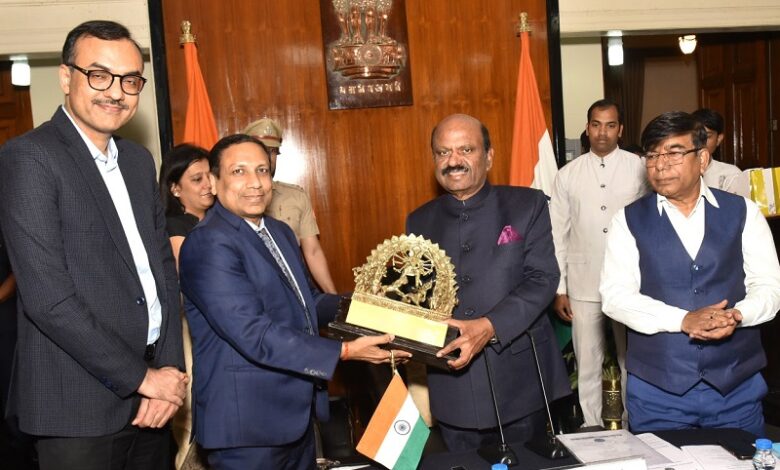Discussion on “National Education Policy 2020” held on 25th February at The Raj Bhavan, Kolkata

Lalit Beriwala, Senior Vice President, MCCI presenting a memento to Dr. C.V. Ananda Bose, Hon’ble Governor of West Bengal. On his left Sunil Agarwal, Chairman, Council on Education, MCCI and extreme right Dr. Subhas Sarkar, Hon’ble Minister of State for Education, GoI
“Once the National Education Policy 2020 will be introduced in Bengal, the youth of Bengal will lead the race”, said H.E. Dr. C.V. Ananda Bose, Hon’ble Governor of West Bengal.Merchants’ Chamber of Commerce & Industry organised a Special Session on the Discussion on The National Education Policy 2020, today at Raj Bhavan, Kolkata.
H.E. Dr. C.V. Ananda Bose, Hon’ble Governor of West Bengal addressed the Session as the Chief Guest and Dr. Subhas Sarkar, Hon’ble Minister of State for Education, Govt. of India addressed the session as the Guest of Honour.
H.E. Dr. C.V. Ananda Bose, Hon’ble Governor of West Bengal in his address said that India is about to become global superpower in economy, education and culture. He complemented the Govt. of India for introducing the NEP 2020 at a very short span of time. He is hopeful that once NEP 2020 is implemented, the youth of India will lead.
His excellency emphasized on the inner strength of the new generation. He urged for the public and private participation in every field to take the nation forward.
Dr. Subhas Sarkar, Hon’ble Minister of State for Education, Govt. of India in his address said that to promote the Sustainable Development Goal, under the leadership of Hon’ble Prime Minister Narendra Modi, the Govt. of India has announced National Educational Policy 2020 on 29th July, 2020. There are 5 main pillars of NEP 2020, namely, Accessibility, Equity, Affordability, Quality and Ability.
Dr. Sarkar requested everyone to be the brand ambassador of the National Educational Policy 2020. While speaking on NPE 2020, he focused on holistic education through quality and continuing education. In Fundamental Literacy and Numerology, the school education would be modified into new pedagogy and 5+3+3+4 curriculum. In the context of Teacher Education, NPE 2020 has focused on multidisciplinary teacher’s training and 4 years integrated B.ed courses will be the minimum qualification for the teachers.
Dr. Sarkar mentioned that Sarba Shiksha Mission has been changed to Samagra Shiskha Mission. In India, already 1668 elementary schools have been upgraded to Higher Secondary schools. Under NEP 2020, the PM Schools has been launched for implementing rising India. The Early Child Care initiative has also launched and under this initiative, Bidya Prabesh for play group children has been launched on 29th July, 2021.
While welcoming the Guests, Shri Lalit Beriwala, Senior Vice President, MCCI in his address lauded The New Education Policy 2020 which seeks to reorient India’s education policy in tune with global benchmarks. The National Education Policy 2020- the first of the 21st century – has been formulated replacing the old National Education Policy of 1986 keeping with the aspirational goals of the 21st-century education, including SDG4 (Sustainable Development Goal 4) of the 2030 Agenda for Sustainable Development.
He pointed out that there is also an urgent need of bridging the hiatus between learning and the job-readiness and also mainstreaming the differently-abled children to the evolving education system so that they can meaningfully participate in the nation building with a sense of full sense of satisfaction, fulfilment and inclusiveness.
The Session ended with a hearty Vote of Thanks proposed by Shri Sunil Agarwal, Chairman, Council on Education, MCCI. He viewed that the issues raised related to the reforms in education were pertinent and he is hopeful that the education outcomes are expected to improve following the implementation of proposed reforms.
(This story has not been edited by News Mania staff and is published from a Media Release)






